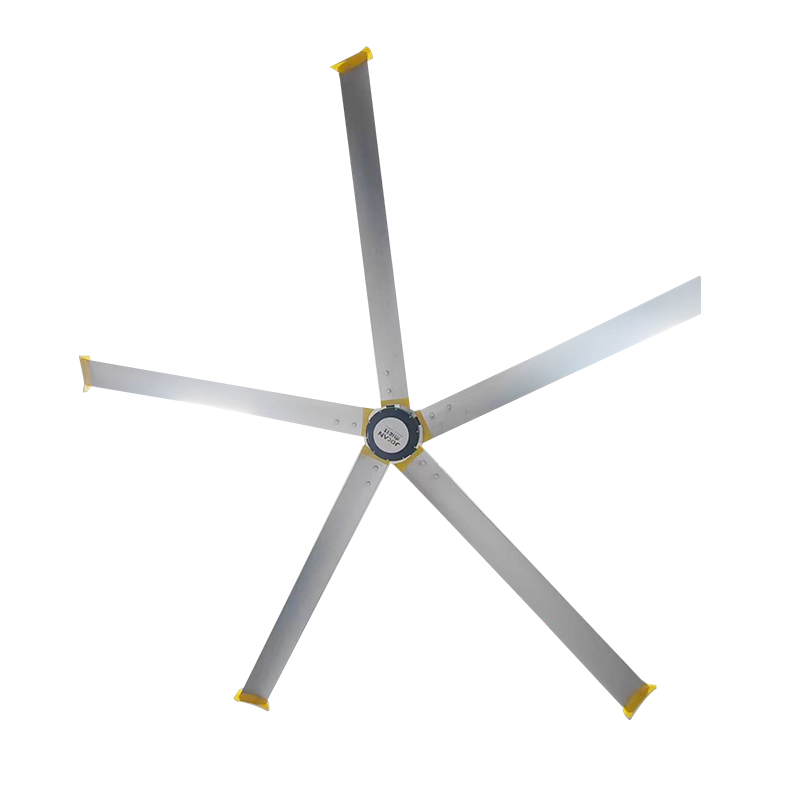Industrial ceiling fans are widely used in large, open spaces such as warehouses, factories, gyms, and commercial buildings to provide efficient airflow, temperature control, and overall comfort. These fans are designed to optimize air circulation, reduce energy costs, and improve working conditions.
Benefits of Industrial Ceiling Fans
Enhanced Air Circulation:
One of the key advantages of industrial ceiling fans is their ability to circulate air effectively across large spaces. This is crucial in environments where air stagnation can lead to discomfort, poor air quality, and inefficiencies in heating or cooling systems. By keeping air in motion, these fans ensure that the temperature is evenly distributed throughout the space.
Energy Efficiency:
Industrial ceiling fans can significantly reduce energy consumption by complementing existing heating, ventilation, and air conditioning (HVAC) systems. During the summer, they help cool spaces by creating a wind-chill effect. In winter, by reversing the fan’s direction, they help redistribute warm air from the ceiling back down to the floor. This dual-function capability lowers energy costs by reducing the load on HVAC systems.
Cost Savings:
Unlike air conditioning units that require high upfront and maintenance costs, industrial ceiling fans offer a more cost-effective solution to regulate temperature. With energy-efficient models, businesses can experience long-term savings on electricity bills while maintaining a comfortable environment.
Improved Comfort and Productivity:
Employees in well-ventilated, temperature-controlled spaces tend to be more productive and have better overall well-being. Industrial ceiling fans help create a comfortable environment in spaces with high ceilings or poor natural ventilation, enhancing comfort levels and reducing fatigue, especially in industries like manufacturing or retail.
Despite these benefits, users often encounter issues with noise levels, improper fan size, or insufficient airflow if the fans are not adequately chosen or maintained.
Services for Industrial Ceiling Fans
To maximize the benefits of industrial ceiling fans, users should seek a range of services that enhance performance and extend the life of the equipment. These include:
Fan Selection and Customization:
A major challenge for users is selecting the right fan for the specific dimensions and needs of their space. Industrial ceiling fans come in different sizes, speeds, and designs, and a professional consultation service can help determine the best choice based on airflow requirements and space layout. Customization ensures that the fan operates efficiently without wasting energy or creating excessive noise.
Installation Services:
Proper installation is crucial for achieving optimal performance. Fans that are poorly installed may not operate as efficiently, leading to uneven air circulation or increased energy consumption. Installation services ensure fans are correctly mounted, balanced, and calibrated for the specific space.
Routine Maintenance and Repairs:
Regular maintenance, including cleaning the blades, checking motor functionality, and ensuring proper alignment, is essential to keep industrial ceiling fans running smoothly. Over time, dust buildup or mechanical wear can affect performance. A reliable maintenance plan can help avoid breakdowns, reduce repair costs, and extend the fan’s lifespan.
Energy Audits and Upgrades:
Energy audits are valuable for identifying opportunities to reduce consumption and optimize fan performance. Upgrading to more energy-efficient models can further decrease operational costs and contribute to sustainability goals.
Applications of Industrial Ceiling Fans
Industrial ceiling fans have a wide range of applications in various industries. Here are some common examples:
Warehouses and Distribution Centers:
In large, open spaces such as warehouses, these fans help to evenly distribute air, improving ventilation and keeping the environment comfortable for workers. They also prevent the buildup of humidity, which can damage inventory and equipment.
Factories and Manufacturing Plants:
Industrial ceiling fans play a crucial role in ensuring a consistent temperature and reducing heat buildup, especially in environments where machinery or equipment generates significant heat. These fans also improve air quality by preventing the accumulation of dust and fumes.
Commercial Spaces and Retail Stores:
In large retail stores, gyms, or restaurants, industrial ceiling fans improve customer comfort by maintaining airflow and regulating temperature. They are especially useful in spaces with high ceilings where traditional fans may not be effective.
 Add: Plot 23, Huanglang Industrial Zone, Jinqing Town, Luqiao District, Taizhou City, Zhejiang Province
Add: Plot 23, Huanglang Industrial Zone, Jinqing Town, Luqiao District, Taizhou City, Zhejiang Province
 TEL: +86-13586083215
TEL: +86-13586083215

 English
English English
English عربى
عربى 한국어
한국어









